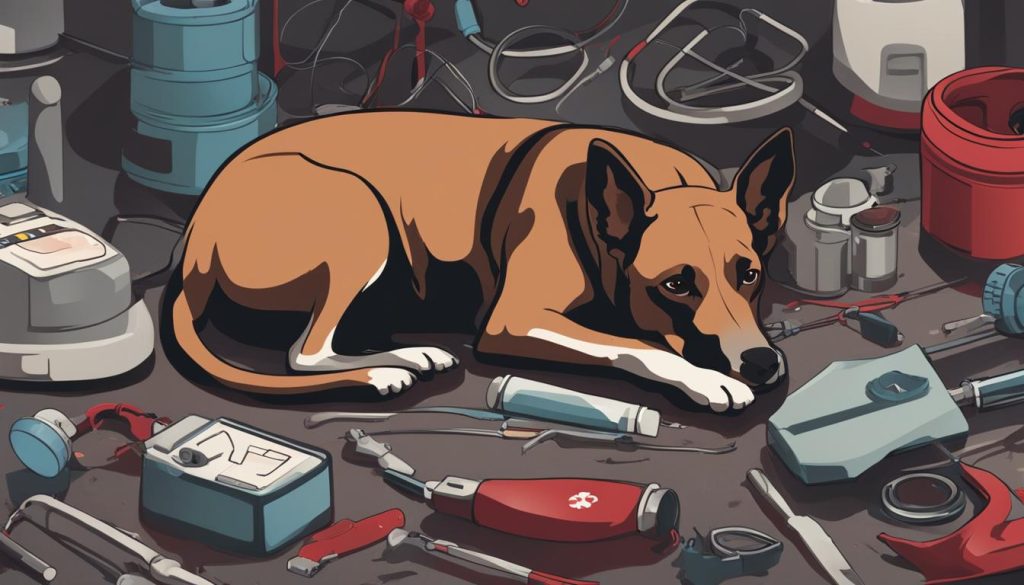As a pet owner, you want to provide the best care and support for your furry friend, and understanding dog diseases and symptoms is a crucial part of that responsibility. Regular check-ups and early detection of common dog diseases can help prevent serious health issues and ensure your dog stays healthy and happy. In this comprehensive guide, I will provide you with valuable insights into a range of canine health topics, including common dog diseases, symptoms of dog illnesses, and care tips to keep your dog’s health in check.
Key Takeaways:
- Recognizing the signs and symptoms of dog diseases can lead to early detection for prompt treatment.
- Common dog diseases include respiratory infections, skin conditions, and digestive issues.
- Maintaining proper nutrition and exercise routines can prevent or manage many canine health problems.
- Learning about various types of diseases and their available treatments can help pet owners make informed decisions.
- Consulting with a veterinarian for any specific health concerns or questions is essential for ensuring the well-being of your dog.
Identifying Dog Disease Symptoms
As a pet owner, it’s essential to recognize the signs of dog diseases and symptoms. Identifying these common canine health issues can help ensure early detection and prompt medical intervention. Some of the signs of dog sickness symptoms to look out for are:
- Loss of appetite and weight loss
- Lethargy and lack of energy
- Increased thirst and urination
- Vomiting and diarrhea
- Coughing and sneezing
- Difficulty breathing and wheezing
- Excessive scratching and skin irritation
It’s essential to monitor your dog’s behavior and track any changes in their daily routine, such as changes in eating or sleeping habits. These signs could be indicative of a more significant health issue, and prompt action is necessary in such cases.
If you notice any of these symptoms of dog diseases, it’s essential to consult with your veterinarian to address the issue adequately. Your veterinarian will perform a thorough examination and recommend the appropriate course of treatment depending on the particular canine disease symptoms.
Remember, being vigilant and aware of the signs of common dog illnesses can help ensure the well-being of your furry companion.
Common Dog Diseases and Ailments
Dogs are beloved and essential members of our families, and like any loved one, we want to ensure they are healthy and happy. Unfortunately, dogs can suffer from various health issues and illnesses throughout their lives, just like humans.
There are several common health problems in dogs that pet owners must be aware of. These include respiratory infections, skin problems, gastrointestinal issues, and more. Identifying the signs of illness in dogs is the first step in treating these ailments quickly and effectively.
Some dog sickness signs that might indicate a health problem include lethargy, loss of appetite, coughing, vomiting, diarrhea, and fever. If you notice any of these signs of illness in dogs, it is crucial to take your furry friend to a veterinarian right away.
In this section, we will explore a range of common dog ailments and their canine disease symptoms. We will provide insights into the causes of these health issues and recommended treatment options for each. From allergies to arthritis, knowledge is power when it comes to taking care of your dog’s health.
Allergies
Allergies are one of the most common dog diseases and can have various origins, such as food, pollen, or flea bites. Canine allergy symptoms include scratching, biting or licking the paws, face, or any other area, redness, and discharge from the eyes or nose. Treatment options include antihistamines, allergy shots, or dietary changes.
Arthritis
Arthritis is a common dog ailment that can cause discomfort and pain in dogs as they age. Canine arthritis symptoms include limping, stiffness, reluctance to move, and difficulty climbing stairs or getting up. While there’s no cure for arthritis, it can be managed with medication, weight management, exercise, and other treatments.
Ear Infections
Ear infections are common in dogs, particularly those with floppy ears or who swim often. Canine ear infection symptoms include head shaking, scratching at the ears, and discharge. Treatment usually involves cleaning the ears and medication to clear up any infection.
Taking care of your dog’s health is crucial for their overall well-being and happiness. By learning about and identifying common dog diseases and ailments, you can be proactive in helping your furry friend stay healthy and happy.
Canine Health Problems and Care Tips
As dog owners, we want to do everything we can to ensure the well-being of our furry friends. Unfortunately, our beloved pets can face various health problems throughout their lives. It’s essential to be aware of common dog health concerns and take measures to prevent or manage them.
Common Dog Health Problems
Some of the most common dog health problems include:
- Obesity and weight-related issues
- Dental problems such as gingivitis and periodontitis
- Arthritis and joint pain
- Allergies
- Digestive issues such as diarrhea and vomiting
- Ear infections
- Urinary tract infections
To prevent these health conditions, it’s crucial to provide your dog with a nutritious, well-balanced diet. Avoid feeding your dog table scraps or high-fat treats. Instead, opt for healthy snacks like apple slices, carrots, or frozen blueberries. Regular exercise is also essential to maintain your dog’s weight and keep them physically active.
Care Tips for Canine Health Conditions
If your dog is experiencing any health conditions, it’s important to seek veterinary care. Your veterinarian can provide a diagnosis and recommend treatment options. Some care tips for common dog health conditions include:
- Brushing your dog’s teeth regularly to prevent dental problems
- Avoiding foods that may trigger your dog’s allergies
- Administering medication as prescribed by a veterinarian
- Cleaning your dog’s ears regularly to prevent infections
- Providing a warm, comfortable place for your dog to sleep to alleviate joint pain
By taking proactive measures to maintain your dog’s health and seeking veterinary care when needed, you can help keep your furry friend healthy and happy.
Understanding Dog Diseases and Treatment Options
As a dog owner, it’s important to be aware of the various diseases that can affect your furry friend, how to recognize them, and the available treatment options. Some common dog illnesses include respiratory infections, skin conditions, and gastrointestinal disorders.
If you notice any symptoms such as lethargy, loss of appetite, vomiting, or diarrhea, it’s essential to consult with a veterinarian for proper diagnosis and treatment. Your veterinarian may recommend medications, such as antibiotics or anti-inflammatory drugs, to address the root of the health issue.
In some cases, surgical intervention may be necessary to treat more severe dog diseases such as cancer or orthopedic problems. Your veterinarian can provide you with the necessary information to decide if surgery is the best treatment option for your dog’s specific needs.
It’s important to note that prevention is key when it comes to managing dog diseases and keeping your pet healthy. Regular visits to the vet, proper nutrition, exercise routines, and good hygiene practices can help maintain your dog’s overall health and prevent the development of some common dog illnesses.

By understanding dog diseases and treatment options, you’re better equipped to provide the best possible care for your furry friend. Remember to always consult with your veterinarian for any health concerns and follow their advice for optimal treatment and management of dog diseases.
Conclusion
As a dog owner, it is crucial to be aware of the common diseases and symptoms that can affect your furry companion. By learning about these health issues, you can take proactive steps to keep your dog healthy and provide timely medical help when needed.
Remember to pay close attention to any changes in your dog’s behavior or appearance, as this could indicate an underlying health problem. Always consult with a veterinarian for guidance and treatment options.
By taking good care of your dog’s health, you can ensure that they live a happy and active life by your side for many years to come.
FAQ
What are some common signs of dog diseases?
Common signs of dog diseases include loss of appetite, lethargy, coughing, sneezing, vomiting, diarrhea, increased thirst, frequent urination, skin rashes, and abnormal behavior.
How can I identify the symptoms of dog diseases?
You can identify the symptoms of dog diseases by observing changes in your dog’s behavior, appetite, and physical appearance. Keep an eye out for any unusual signs and consult with a veterinarian for a proper diagnosis.
What are some common dog diseases and ailments?
Some common dog diseases and ailments include parvovirus, distemper, kennel cough, allergies, arthritis, dental issues, ear infections, urinary tract infections, and skin infections.
How can I prevent and manage common dog health problems?
To prevent and manage common dog health problems, ensure your dog receives regular vaccinations, maintain a balanced diet, provide regular exercise, practice good dental hygiene, keep their living environment clean, and schedule regular check-ups with a veterinarian.
What are the different treatment options for dog diseases?
Treatment options for dog diseases depend on the specific condition. They can range from medications, surgeries, dietary changes, and other specialized treatments. Consult with a veterinarian for an accurate diagnosis and appropriate treatment plan.






